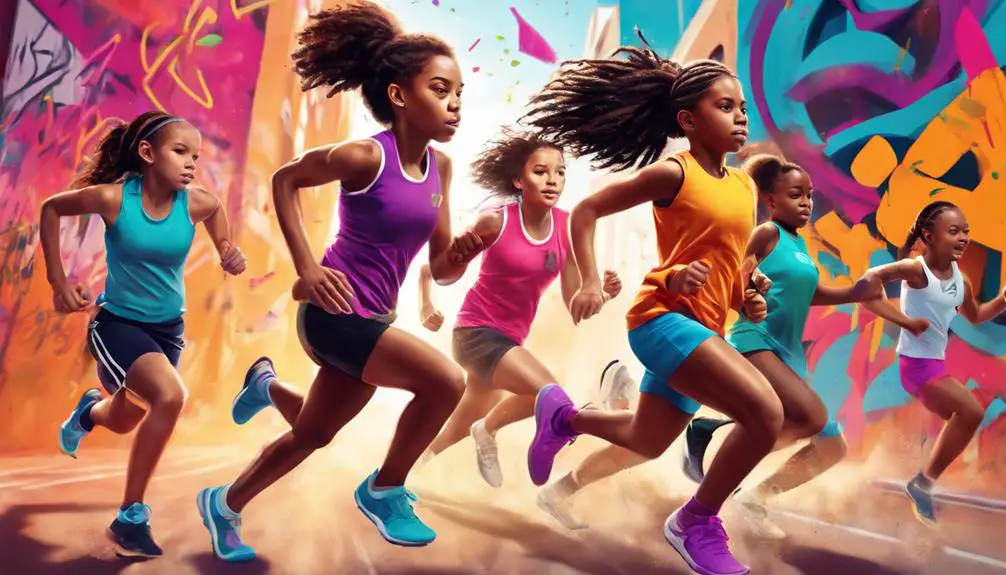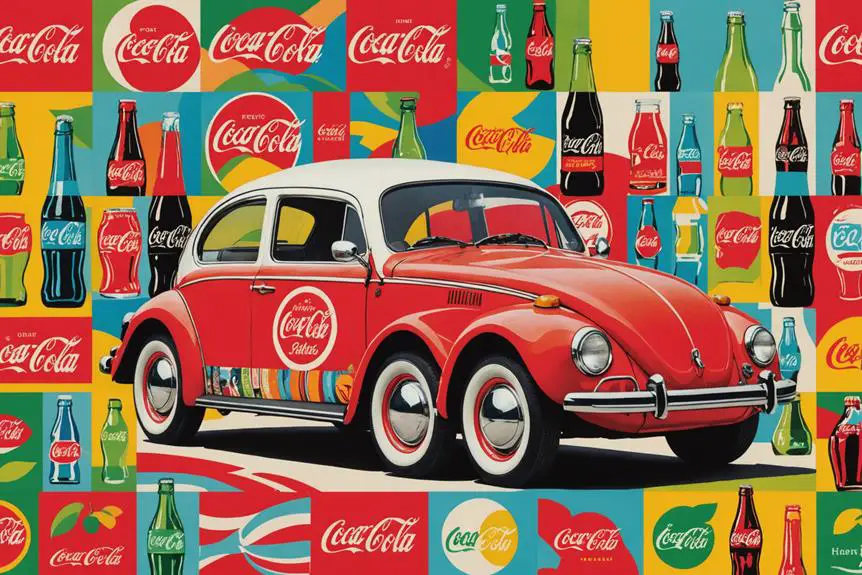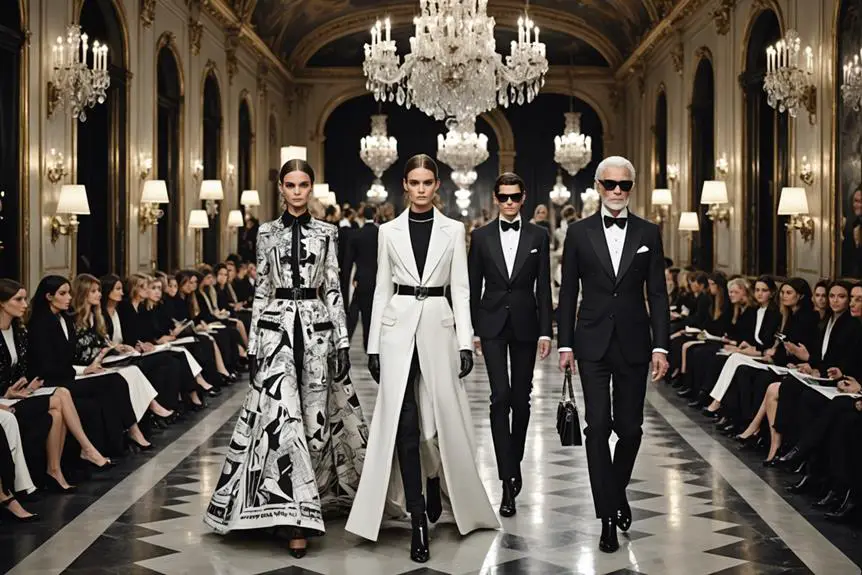Iconic starter advertising campaigns have truly reshaped the marketing landscape. Consider Nike's "Just Do It" from 1988, which inspired millions and skyrocketed sales from $877 million to $9.2 billion. Dove's 2004 "Real Beauty" campaign challenged beauty standards and doubled their revenue, while Always' 2014 #Like A Girl aimed to empower young girls and make over 85 million views on YouTube. Pepsi's 2019 "Is Pepsi OK?" connected humor with brand preference during Super Bowl LIII, and WestJet's 2013 "Christmas Miracle" turned travel into magic, boosting bookings considerably. Each campaign's impact reveals deeper lessons in consumer engagement. Explore these intriguing stories further!
Nike: Just Do It Campaign

Nike's "Just Do It" campaign kicked off in 1988 and quickly became a game-changer in the world of advertising. This marketing campaign featured a powerful message that resonated deeply with consumers, focusing on themes of motivation and athletic achievement. Inspired by the last words of convicted murderer Gary Gilmore, the slogan aimed to encourage people to push their limits, regardless of their circumstances.
It wasn't just about sports; it was about overcoming adversity and embracing determination. The campaign also aligned with Nike's strategic vision, emphasizing the importance of innovation in product development, which has been essential for appealing to a broader audience Nike's corporate structure.
As the campaign gained traction, Nike's brand awareness skyrocketed. Within a decade, the company's market share in North America jumped from 18% to an impressive 43%. This remarkable growth solidified Nike's position as a leader in the athletic footwear and apparel market.
Not only did the campaign enhance brand visibility, but it also showcased the effectiveness of emotional branding. Sales soared, increasing from $877 million in 1988 to $9.2 billion by 1998.
"Just Do It" transcended advertising and became an integral part of popular culture. The slogan entered the vernacular, becoming synonymous with motivation and determination worldwide. It inspired countless individuals to embrace their challenges and aim for greatness.
Today, when you hear "Just Do It," you know it's about more than just a brand; it's a powerful call to action that encourages you to take that first step towards your goals.
Dove: Real Beauty Campaign
Since its launch in 2004, Dove's Real Beauty Campaign has profoundly challenged traditional beauty standards by showcasing real women of various body types and ages. This iconic ad campaign began with a startling statistic: only 2% of women considered themselves beautiful. By featuring diverse body types, Dove aimed to bridge this gap in self-esteem and promote body positivity.
One of the campaign's standout moments was the Real Beauty Sketches video. It highlighted the stark difference between how women view themselves and how others perceive them. It resonated with viewers globally, racking up over 200 million views. This powerful message reinforced the importance of recognizing beauty in all its forms, pushing back against narrow beauty ideals.
The success of the Real Beauty Campaign isn't just about its cultural impact. Dove saw remarkable sales success, with revenue nearly doubling to $4 billion since the campaign began. This financial achievement proves that consumers not only appreciate authentic representation but also support brands that promote self-love and acceptance.
Dove's commitment to real women and their stories sparked broader conversations about body positivity and self-esteem across the beauty industry and beyond. It encouraged many other brands to rethink their advertising campaigns, embracing inclusivity as a core value.
Always: #Like A Girl

There's no denying the impact of Always' #LikeAGirl campaign, which launched in 2014 to challenge the negative stereotypes associated with the phrase "like a girl." By promoting female empowerment and confidence, the campaign featured a powerful video that starkly contrasted how young girls and older women interpret the phrase when asked to perform various actions. This striking difference opened up conversations about gender stereotypes that many had previously ignored.
With over 85 million views on YouTube in just a few months, the campaign's success skyrocketed, driving significant brand engagement for Always. People connected with the message, and research showed that 94% of participants felt the campaign positively impacted how girls view themselves. This boost in self-esteem was essential, as it helped redefine the negative connotation of "like a girl" into a badge of honor.
By tackling social issues surrounding women's rights, Always established itself as a champion for female empowerment. The campaign didn't just stop at raising awareness; it laid the groundwork for ongoing initiatives focused on building confidence among young girls. Always showed that brands can play a significant role in promoting positive change.
In a world where gender stereotypes often prevail, the #LikeAGirl campaign continues to inspire and encourage girls everywhere to embrace their strength. Always transformed a simple phrase into a rallying cry for self-acceptance and empowerment, proving that sometimes, it's about how you say it that truly matters.
Pepsi: Is Pepsi OK?
Pepsi's "Is Pepsi OK?" campaign, which debuted during Super Bowl LIII in 2019, cleverly tapped into a familiar dining scenario that many can relate to. Imagine sitting in a restaurant when someone asks for a Coke, and the server replies, "Is Pepsi OK?" This humorous twist highlights the ongoing rivalry between Pepsi and Coca-Cola, making it not just a campaign, but a conversation starter about brand preference.
Key elements of this campaign include:
- Celebrity appearances from Steve Carell and Cardi B
- A limited-edition can design featuring the catchy tagline
- A focus on consumer self-awareness and perceptions
- Strategic timing during the Super Bowl for maximum visibility
By using humor, the campaign resonated with consumers, making Pepsi's brand identity more relatable and memorable.
The strategic placement during the Super Bowl, a peak advertising moment, aimed to enhance visibility and engage a broad audience. It was more than just an ad; it was a clever way to initiate discussions around soda choices, reinforcing the brand's presence in a competitive market.
Pepsi's approach emphasized the importance of recognition and visibility in advertising. By integrating humor into a relatable scenario, they not only entertained but also sparked conversations about consumer preferences.
The campaign successfully highlighted Pepsi's identity while inviting consumers to embrace the brand in a lighthearted way. In doing so, they created a memorable moment that elevated their position in the ever-competitive soft drink landscape.
WestJet: Christmas Miracle

In 2013, WestJet launched its heartwarming Christmas Miracle campaign, which transformed the typical airport experience into a magical moment for travelers. Instead of just checking in, passengers found themselves immersed in an unexpected surprise. While they expressed their holiday wishes to a virtual Santa, WestJet made those dreams come true by presenting them with gifts at baggage claim. This clever storytelling created significant emotional engagement, resonating deeply with viewers.
The campaign's heartwarming video quickly went viral, racking up over 38 million views on YouTube in just a few weeks. This overwhelming response not only showcased the power of community and goodwill during the holiday season but also bolstered WestJet's brand loyalty. After the campaign, there was a remarkable 20% increase in bookings, proving that the emotional connection had a tangible impact on business.
Moreover, WestJet saw a 30% increase in positive sentiment, as measured through social media interactions and customer feedback. People felt inspired and connected, not just to the airline, but to the spirit of giving that the campaign embodied.





This piece of writing presents clear idea designed for the new viewers of blogging, that genuinely how to do blogging.
casino en ligne francais
Oh my goodness! Amazing article dude! Thank you
so much, However I am experiencing issues with your RSS. I don’t understand the reason why I am unable to join it.
Is there anyone else getting identical RSS problems? Anybody who knows the solution will you kindly respond?
Thanx!!
meilleur casino en ligne
After going over a number of the articles on your site, I honestly like your way of blogging.
I book marked it to my bookmark site list and will be checking back in the near future.
Please visit my website too and let me know how you feel.
casino en ligne
I think this is one of the most important info for me. And
i am glad reading your article. But want to remark on few general
things, The site style is wonderful, the articles is really great : D.
Good job, cheers
casino en ligne
Hi, i think that i saw you visited my blog so i came to “return the favor”.I am attempting to find things to improve
my web site!I suppose its ok to use some of your
ideas!!
casino en ligne
I do not even know how I ended up here, but I thought this post was good.
I don’t know who you are but definitely you’re going to a famous blogger if
you are not already 😉 Cheers!
casino en ligne
Fantastic goods from you, man. I’ve understand your stuff previous to and you’re just
too great. I actually like what you’ve acquired here, certainly like what you are stating and the way in which you
say it. You make it entertaining and you still take care of to keep it wise.
I can’t wait to read far more from you. This is really a wonderful site.
meilleur casino en ligne
I got this web page from my buddy who shared with me about this web page and now this time
I am browsing this web page and reading very informative content at this time.
casino en ligne
Howdy would you mind sharing which blog platform you’re working with?
I’m looking to start my own blog soon but I’m having a tough time
choosing between BlogEngine/Wordpress/B2evolution and Drupal.
The reason I ask is because your design seems different then most blogs and I’m looking for something
unique. P.S Sorry for getting off-topic but I
had to ask!
casino en ligne
It is truly a nice and useful piece of information.
I’m satisfied that you shared this useful info with us.
Please keep us up to date like this. Thank you for sharing.
meilleur casino en ligne